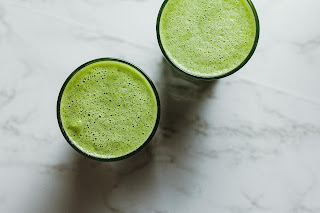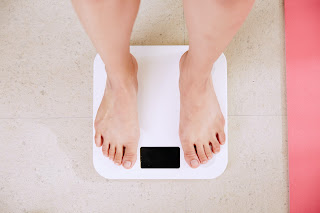Is a detox diet the best for weight loss?
Hi everyone! This blog post is going to talk about the detox diet as part of my debunking popular weight loss diets series.
Detoxing your body is meant to lead to weight loss, improved energy levels and a boosted immune system. These are some tall promises, so let's see.
For the sake of
balance, I’m going to look at both sides of the argument for the detox diet to
give you the facts to make informed choices about your food.
What is a detox diet?
There isn’t a universal definition of the detox diet, but
generally, it involves a period of fasting and then ‘detoxing’ your body by only eating fruit, vegetables, and juices. Other liquids that may be allowed on the
diet would be things like tea, bone broth, and water.
Some variations of the diet include taking detox pills,
detox teas, and/or detox powders.
The aim is to clear out the ‘build up’ of toxins in your
body and allow your organs to rest. There’s no suggestion of what toxins are
being removed, or how they’re being removed.
You follow this detox/cleanse for up to a month and apparently enjoy the
benefits like feeling more energised, better skin and nails, and improved
digestion.
Positives of the detox diet:
In the sake of fairness, let’s look at some positive parts
of the diet.
It avoids ultra processed foods:
One positive of the diet is that by focusing on fruit and vegetables, you’ll limit your intake of ultra processed foods that tend to be high in salt and sugar. Too much ultra processed foods can be bad for our health and increase the risk of certain diseases. However, you don’t need to completely eliminate these foods as they can be useful in balanced diet. They also can be a source of nutrients, like a breakfast cereal with added vitamins for example.
It focuses on fruit and vegetables:
I’m sure I don’t need to convince you that fruit and vegetables are a crucial part of our diets. They're packed with fibre, vitamins, and minerals which all keep our body healthy and working at its best.
But
eating only fruit and veg isn’t a balanced diet, and won’t provide your body
with all the nutrients it needs.
Negatives of the detox diet:
There are many more negatives to this diet.
It’s not based in scientific fact:
My main issue with detox diets is that a detox diet simply
doesn’t exist. There’s nothing you can eat or drink that will detox your body.
Your liver and kidneys are key organs in your body, and they are what detox
you.
Your liver has many roles including the breakdown of nutrients,
the breakdown of medications and alcohol, and the conversion of substances in a
less harmful form. These waste products come out in your poo. Your kidneys
filter your blood and remove waste from it, with the waste products leaving
your body in your wee. This is all the detox that you need.
These organs are your natural detoxifiers, and they don’t
need a special diet to work as they're constantly detoxing your body. To put it frankly, if your
liver or kidneys weren’t working well, you’d need to seek medical treatment,
not a green juice.
Of course, a healthy balanced diet will support your organs
and allow them to work well, but a detox diet is unnecessary and won’t provide
any extra benefit.
There’s also no evidence for any of the other health claims
it makes. There’s no proof that having better digestion or better skin and
nails is due to following this diet. Again, fruit and vegetables contain lots
of nutrients that help our body’s function, but you don’t need a detox diet to
see those benefits.
Fasting is unnecessary:
Some detox diets want you to fast for periods of time or
massively restrict the number of calories you eat. Fasting when you don’t need
to is essentially starving your body of the energy it needs to function. This
can leave you feeling tired, dizzy, and weak.
I also don’t see how going hungry will help your body to
detox, as your body needs energy to work. I imagine the idea is to minimise the 'toxins' you might be exposed to through food, but it’s not very clear. Nevertheless,
fasting isn’t needed to’ detox’ your body.
We know extreme restriction isn’t good for us:
As I always say when looking at popular diets, severely
restricting what you eat can be a recipe for disaster.
Firstly, when we follow an extreme diet, it can be hard to stick
to as there’s not many options of what you can eat. This can lead to irritation,
frustration, and a lack of motivation. Secondly, when we restrict something, it
can make us want it more and could mean that when we eat that food, we overeat. Putting yourself through emotional turmoil for no reason doesn't sound great to me.
We also know that dieting can lead to binge eating and it can be
a risk factor for developing an eating disorder, so it can be getting into
dangerous territory to follow a diet this drastic. And I’m not saying that you
doing a week long detox diet will lead to an eating disorder but it’s a risk
that can’t be ignored.
It’s unbalanced:
As the detox diet focuses on eating mainly fruit and vegetables, it means you’re missing out on the other key nutrients that form a balanced diet. You’ll be missing out on all three macronutrients: protein, fat, and carbohydrates. This doesn’t sound great, as we know that these are essential.
Cutting out the majority of the food groups, for no matter
how long, isn’t a great idea as your body needs all the nutrients to function.
Will the detox diet lead to weight loss?
If you’re spending days fasting or only consuming fruit and vegetables, then yes you will lose weight. Not surprisingly, this is due to the severe calorie restriction you’ll be under. However, the majority of the initial weight loss will be water weight. This is because your body will utilise its carbohydrate stores for energy, and water is stored with them too.
If you're doing a longer detox, your body could start breaking down your muscle to use for energy too, which is not what we want.
It’s not a sustainable way to lose weight, as any weight
lost will most likely come straight back when you stop detoxing and go back to
eating like you normally would. Making weight loss long lasting means making
lifestyle changes that you can keep up with for good.
In conclusion…
The detox diet is a fad that isn’t worth trying. The diet isn’t backed up by scientific reality and any health benefit it promises is unlikely to last. It has some good ideas with eating more fruit and vegetables, but a healthy balanced diet includes all food groups.
If you want sustainable weight loss, you need to make permanent lifestyle changes. I've got a book all about this, you can find it here.
Key points:
- A detox diet usually involves fasting, eating mainly fruit and vegetables, and limiting ultra processed foods.
- Detoxing your body through food isn’t possible, as your organs do that already. The diet also is very extreme, is unbalanced, and puts your body under a drastic calorie restriction.
- The diet does promote eating more fruit and vegetables and limiting processed foods, which are good ideas, but the diet overall isn’t sustainable.
- A detox diet will lead to weight loss, but anything lost will come back when you go back to eating as normal.
I hope you found this useful!
Bye for now 👋
References:
Detox diet: https://www.nhs.uk/livewell/tiredness-and-fatigue/documents/truthdetoxdiets.pdf
https://www.bda.uk.com/resource/detox-diets.html
Liver role: https://www.ncbi.nlm.nih.gov/books/NBK535438/
Kidney role: https://www.niddk.nih.gov/health-information/kidney-disease/kidneys-how-they-work
Dieting and eating disorders: https://pubmed.ncbi.nlm.nih.gov/33410207/
https://pubmed.ncbi.nlm.nih.gov/27709979/
Detox diets having no evidence: https://pubmed.ncbi.nlm.nih.gov/25522674/

.jpg)

.jpg)

.jpg)

Comments
Post a Comment